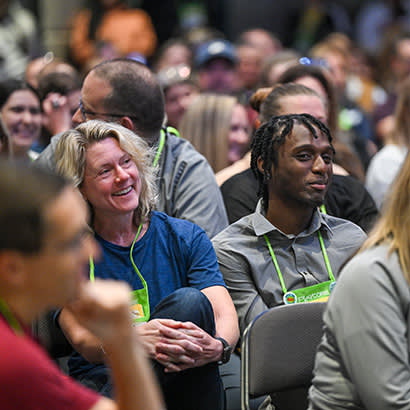
For an enhanced digital experience, read this story in the ezine.
Equity in Practice (EiP) is how we advance equity. To create a future where everyone has fair and just access to public spaces and feels welcome, we need to act. Equity requires practice, patience and a commitment to progress. EiP provides professionals opportunities to put equity into practice in a variety of settings and ways and helps members increase their knowledge around centering equity while practicing the necessary skills to advance equity in our communities.
In 2021, NRPA launched the Equity in Practice (EiP) program, highlighting the good work already happening in the field and sharing NRPA’s plans to help members advance equity as individuals, within agencies and with communities. Check out a few upcoming sessions scheduled for the 2024 NRPA Annual Conference.
Breaking Glass and Shaking Tables: Solidifying the Role of Women in Leadership
Baltimore City Recreation and Parks Department
When sexism intersects with other forms of discrimination in the workplace, the impact is devastating. Research indicates that both factors can negatively affect women across various occupations. Managing external dynamics while prioritizing internal workplace operations, women leaders play a central role in redefining the next generation of leaders.
Where to Begin? Introducing Programmatic Changes to Include People With Disabilities
Move United
Move United uses sports to push what’s possible so everyone has equal access to sports and recreation in their community. Participants are encouraged to bring their questions and/or experiences as we discuss accessibility considerations for programs, easy program/facility modifications, easy-to-implement inclusive sports and outreach tactics to connect with local community members interested in participating.
Web Accessibility and the Americans with Disabilities Act
Wheeling (Illinois) Park District
Inaccessible web content can exclude community members, just like the poor design of a facility. During the past couple of years, ensuring accessibility for people with disabilities has been a priority for the federal government, which has recently published guidance on how government and businesses can make sure their websites are accessible to people with disabilities in line with the ADA’s requirements. Park and recreation agencies must learn how they can prevent and remove these barriers to accessing information.
Whose Park Is It Anyway?
Greensboro (North Carolina) Parks and Recreation
Parks and recreation should provide our communities with equitable access to all resources. However, we often see disparities in programs participation by people of color. Attendees will be asked to share stories and strategies that are helping them foster a strong collaborative culture by discussing topics, such as understanding historic barriers to recreation for African Americans, managing relationships with community stakeholders online and offline, and more.
Ageism Unveiled: The Transformative Power in Reversing Ageism
Town of Erie (Colorado) Parks and Recreation Department
Ageism is a significant societal issue that can have profound implications for health and impose a substantial economic burden on both individuals and society. It’s important to reshape younger generations’ views on aging. Through tailored programs, strategic staffing and thoughtful services, parks and recreation can take a hands-on approach toward addressing ageism and positively influence both our community’s outlook and the self-perception older adults have.
Meet Me at the Crossroads: Navigating Intersections Through a Personal Lens in a Park and Recreation Career
Davidson Park and Recreation
Join in for an inspiring and transformative session as we delve into the personal and professional experiences of navigating the intersections of race, gender, sexuality and gender identity within the field of parks and recreation. This engaging presentation offers a unique blend of personal narrative and professional insights, providing participants with valuable perspectives and practical strategies. Don't miss this opportunity to be inspired, informed and equipped with the knowledge to drive positive change in parks and recreation. Join in for a session that goes beyond theory, providing real-world perspectives and tools for a more inclusive future in our field.
Promoting 2SLGBTQIA+ Diversity and Inclusion Through Policy and Programming
Maryland Recreation and Parks Association
In 2023, Maryland Recreation and Parks Association (MRPA) held the first MRPA 2SLGBTQIA+ Summit, a one-day event designed for park and recreation administrators, human resources staff and programmers who want to understand the unique considerations and barriers to program participation among the 2SLGBTQIA+ population. This session will highlight the lessons learned from that session and share learnings on gender-inclusive terms, national and state accommodation laws, and more simply, how to affirm all program participants through language, practices and policies.
Editor’s Note: This version has been updated to reflect the correct title, agency and description for the session “Meet Me at the Crossroads: Navigating Intersections Through a Personal Lens in a Park and Recreation Career” and the correct title, agency and description for the session “Promoting 2SLGBTQIA+ Diversity and Inclusion Through Policy and Programming.”


